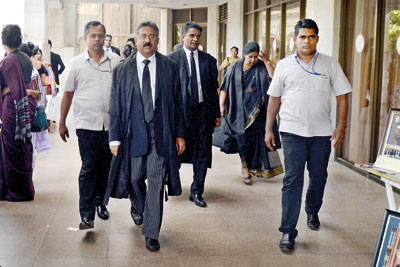News
Don’t subvert people’s will, says AG
President Maithripala Sirisena was elected to a six-year term by popular mandate and to make him submit to a five-year term limit passed subsequently would set aside the people’s sovereignty.

Attorney-General Jayantha Jayasuriya arrives in court on Thursday. Pic by Priyantha Wickramaararchchi
This was the argument mounted by the country’s chief legal officer, Attorney-General Jayantha Jayasuriya this week before a five-member bench of the Supreme Court invited by President Sirisena to state how long he could remain in office.
Appearing on behalf of the state, the Attorney-General pointed out that as President Sirisena had taken office before the 19th Amendment limiting a presidential term to five years was passed, the nation had given him a mandate of six years, until 2021.
The Supreme Court bench, consisting of Chief Justice Priyasath Dep, justices Eva Wanasundera, B.P. Aluvihara, Sisira J. De Abrew and K.T. Chitrasiri, have heard a series of public submissions and Mr. Jayasuriya argued that President Sirisena’s term had already commenced on 9 January 2015 under Article 30(2) of the Constitution by the time the 19th Amendment was introduced into parliament later that year, on May 15. Thus the new legislation did not affect his term of office.
There were no provisions for retrospective change of an existing term of presidential office in the 19th Amendment, the Attorney-General said. Thus there could not be any retrospective effect in the Amendment.
Mr Jayasuriya argued there is no provision in 19 Amendment that those provisions are made retrospectively.
“Even the President himself cannot change the term of the presidency. He can resign but he cannot make any change in the term of office,” the Attorney-General told the five judge Supreme Court bench.
He also indicated that the lifetime of the 7th Parliament, which was concluded on 21 April 2016, did not have any impact on President Sirisena’s six-year term.
He added that according to the Constitution, if Mr. Sirisena were to leave office before the six-year term to which he was appointed had elapsed the next president would have to cover the remaining period of his presidency.
“The term of the presidency is not disturbed even when a president is removed through an impeachment. Due process would be followed and the next president will cover the rest of the presidency left by the former one,” Mr. Jayasuriya said.
In making his submissions the Attorney-General Jayasuriya appeared along with Additional Solicitor-General Murudu Fernando and Deputy Solicitor-General Nerin Pulle.
Two similar submissions made on intervenient petitions supporting the Attorney-General’s stand were filed by the General Secretary of Sri Lanka Freedom Party (SLFP) Duminda Dissanayake and the Ven. Ulapane Sumangala Thera. Saliya Peiris PC appeared on behalf of the Ven. Ulapane Sumangala Thera and Faisz Musthapha PC for the SLFP General Secretary.
More than six intervenient petitions were filed on the basis that this 19th Amendment to the Constitution makes express provision that the President’s term is limited to five years.
The Centre for Policy Alternatives (CPA), the Campaign for Free and Fair Elections (CaFFE), parliamentarian Udaya Gammanpila, Professor Tissa Vitharana, Professor Gunadasa Amarasekara and Manohara de Silva PC, appearing for Prof. G.L. Peiris took the stand to submit that changes to the posts of president and prime minister came into immediate operation when the 19th Amendment was passed in parliament.
Mr. de Silva PC also noted that President Sirisena had reportedly stated at a public meeting in Polonnaruwa recently that he had been willing to reduce the term of the presidency to four years through the 19th Amendment but that the Constitutional Experts Committee had insisted it should be five years. (SR)

